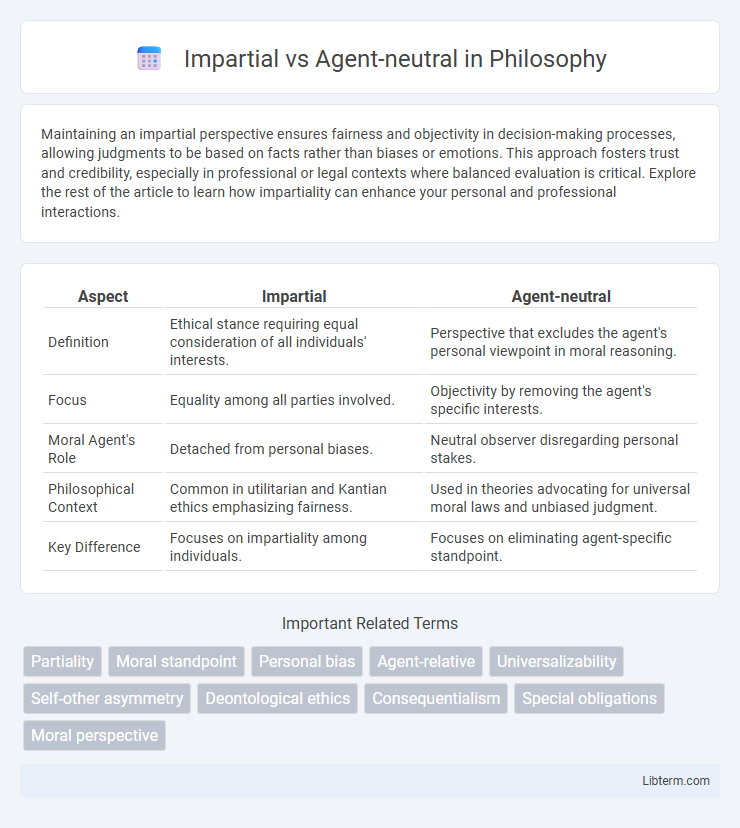Maintaining an impartial perspective ensures fairness and objectivity in decision-making processes, allowing judgments to be based on facts rather than biases or emotions. This approach fosters trust and credibility, especially in professional or legal contexts where balanced evaluation is critical. Explore the rest of the article to learn how impartiality can enhance your personal and professional interactions.
Table of Comparison
| Aspect | Impartial | Agent-neutral |
|---|---|---|
| Definition | Ethical stance requiring equal consideration of all individuals' interests. | Perspective that excludes the agent's personal viewpoint in moral reasoning. |
| Focus | Equality among all parties involved. | Objectivity by removing the agent's specific interests. |
| Moral Agent's Role | Detached from personal biases. | Neutral observer disregarding personal stakes. |
| Philosophical Context | Common in utilitarian and Kantian ethics emphasizing fairness. | Used in theories advocating for universal moral laws and unbiased judgment. |
| Key Difference | Focuses on impartiality among individuals. | Focuses on eliminating agent-specific standpoint. |
Understanding Impartiality in Ethics
Impartiality in ethics emphasizes equal consideration of all individuals' interests without favoritism, ensuring fair and unbiased moral judgments. Agent-neutral perspectives evaluate actions based on their consequences for everyone equally, regardless of who performs them, while agent-focused views allow for special considerations tied to the individual's role or relationships. Understanding the distinction between impartial and agent-neutral ethics clarifies how moral principles apply objectively across diverse situations and agents.
Defining Agent-Neutral Perspectives
Agent-neutral perspectives prioritize outcomes and principles applicable universally, independent of any specific individual's interests or roles. This view contrasts with impartiality, which emphasizes fairness by treating all agents equally without bias. Defining agent-neutral perspectives involves analyzing ethical decisions based on universalizable standards rather than relativistic or agent-specific considerations.
Key Differences: Impartial vs Agent-Neutral
Impartiality demands equal consideration of all individuals' interests regardless of personal relationships, emphasizing fairness without favoritism. Agent-neutrality requires actions to be justified independently of the agent's particular identity or perspective, supporting decisions that hold universally. The key difference lies in impartiality focusing on equal treatment among affected parties, while agent-neutrality centers on neutrality concerning the agent's standpoint in moral reasoning.
Historical Context and Philosophical Roots
Impartiality traces back to ancient Greek philosophy, particularly Aristotle's concept of justice as fairness and equality, emphasizing decisions free from personal bias. Agent-neutral perspectives emerged more prominently in modern ethical theory, especially in the 20th century through thinkers like Peter Singer, stressing outcomes regardless of who performs the action. These philosophical roots reveal an evolution from ensuring fairness among individuals to prioritizing universal principles that apply independently of agents' identities or motives.
Impartiality in Moral Decision-Making
Impartiality in moral decision-making requires evaluating actions and consequences without favoritism toward any individual or group, ensuring equal consideration of all affected parties. This principle contrasts with agent-neutral perspectives by emphasizing that moral judgments should not prioritize the decision-maker's interests over others. Focusing on impartiality promotes fairness and objectivity, key factors in ethical deliberation and just outcomes.
The Role of Agency in Ethical Theories
Impartial ethical theories prioritize equal consideration of all individuals' interests, treating every agent's perspective without bias, whereas agent-neutral theories emphasize outcomes independent of the agent's identity or relationships. The role of agency in these frameworks determines whether moral obligations are derived from the agent's position or from universal principles applicable to all agents. This distinction influences how ethical decisions weigh personal commitments against overarching impartial judgments in moral reasoning.
Practical Implications of Both Approaches
Impartial approaches in ethics emphasize equal concern for all individuals, influencing policies that promote universal welfare and fairness in resource allocation. Agent-neutral frameworks prioritize outcomes regardless of who acts, guiding decision-making in scenarios like public health where maximizing overall benefit takes precedence. Practical implications include the challenge of balancing personal commitments against impartial duties, affecting legal judgments, healthcare priorities, and social justice initiatives.
Common Misconceptions and Clarifications
Impartiality and agent-neutrality are often confused, but impartiality requires fairness and equal consideration for all parties, while agent-neutrality demands no advantage based on the agent's identity or role. A common misconception is that agent-neutrality implies complete detachment, but it actually means decisions should not favor the agent's perspective over others. Clarifying this distinction is crucial for ethical theories and decision-making frameworks that seek to balance fairness with contextual responsibilities.
Notable Philosophers and Their Arguments
Notable philosophers like Thomas Nagel and Bernard Williams have extensively debated the distinction between impartial and agent-neutral perspectives, emphasizing the importance of moral reasoning that transcends individual biases. Nagel argues that agent-neutral ethics requires individuals to adopt viewpoints detached from personal interests, while Williams contends that impartiality can sometimes ignore the moral significance of personal commitments. These contrasting viewpoints highlight the ongoing philosophical challenge of balancing universal moral principles with the particularities of individual agency.
Impartiality vs Agent-Neutrality: Contemporary Debates
Impartiality demands decision-makers to treat all individuals equally, emphasizing fairness without favoritism, while agent-neutrality requires choices that do not privilege the agent's own interests over others. Contemporary debates in ethics explore whether moral theories should prioritize impartiality's equal concern or embrace agent-neutrality's detachment from the agent's perspective. Philosophers analyze these concepts to determine how moral judgments balance personal commitment with universal ethical standards.
Impartial Infographic

 libterm.com
libterm.com